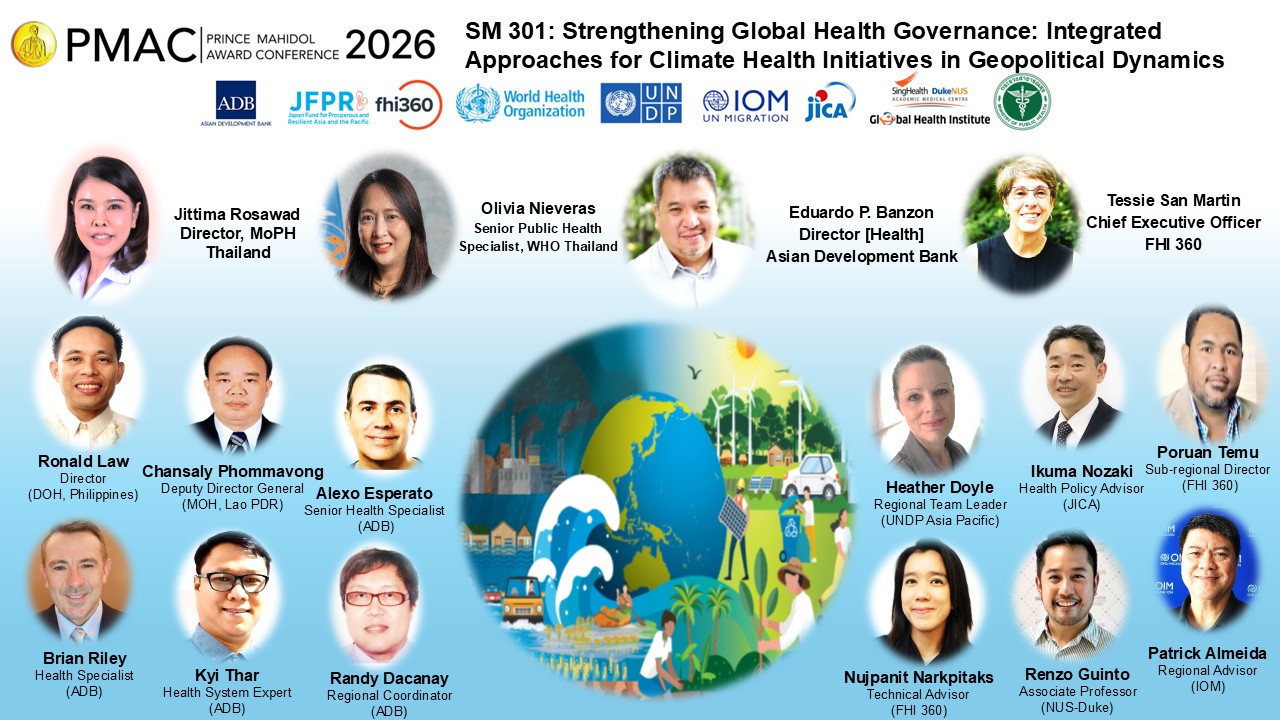Side Meetings
SMB301
Strengthening Global Health Governance: Integrated Approaches for Climate Health Initiatives in Geopolitical Dynamics
26
Jan
- Asian Development Bank
- FHI 360
- World Health Organization
- United Nations Development Programme
- International Organization for Migration
- Japan International Cooperation Agency
- Ministry of Public Health Thailand
- SingHealth Duke-NUS Global Health Institute

Climate change is weakening health systems during increasing geopolitical tensions. Rising global temperatures and extreme weather events such as heat waves, floods, and storms increase the incidence of vector-borne diseases (e.g., malaria, dengue) and threaten food and water security. These impacts intersect national borders and disproportionately affect marginalized communities. Health facilities are also vulnerable to climate change, as during weather events, they get quickly overloaded but must often shut down due to climate impacts. Competition over scarce resources (e.g., water, arable land) and health security measures (e.g., vaccine distribution during the COVID-19 pandemic) intensified geopolitical tensions, hindering a coordinated response.
Additionally, the global health governance structure is insufficient to manage transboundary risks of climate change. Key challenges include fragmented health systems with isolated early-warning systems, missed opportunities for planning and preparedness, and inadequate adaptation policies as many national health strategies are not aligned with climate adaptation. As a result, health systems remain vulnerable to the climate crisis and related disasters. By linking technical solutions with effective governance and demographic shift, we can protect health, promote equity, and create a more stable and collaborative geopolitical context in the future. We are seeking partners to help us realize this critical vision.
This side meeting will discuss strategic governance and cooperation to strengthen health systems' climate resilience amid geopolitical uncertainty. The meeting will update knowledge and best practices on (1) governance, policy, and planning: National Health Adaptation Plans, (2) innovative solutions to detect climate risk and improve climate-smart health systems, and (3) promote protection of climate risk to marginalized populations, including climate refugees. By combining these elements into a unified framework, this event aims to protect public health, reduce vulnerability, and promote health security to enhance good governance during geopolitical dynamics.
The side event aims to:
- Identify solutions to promote leadership, knowledge, and good governance to safeguard the population and protect vulnerable populations from climate risks during times of geopolitical uncertainty.
- Discuss the policies and mechanisms to strengthen the climate adaptation of the health system. These include multistakeholder dialogues, collaborative planning, resource pooling, and the implementation of National Health Adaptation Plans.
- Provide an update on climate-smart innovations, including risk mapping, early warning systems, climate-smart infrastructures, and supply chains. Provide recommendations on the implications of those innovative solutions for climate-resilience health systems.

